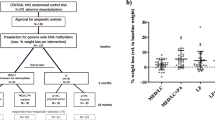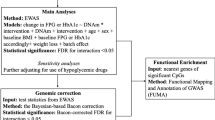Abstract
Background
Weight loss can be influenced by genetic factors and epigenetic mechanisms that participate in the regulation of body weight. This study aimed to investigate whether the weight loss induced by two different obesity treatments (energy restriction or bariatric surgery) may affect global DNA methylation (LINE-1) and hydroxymethylation profile, as well as the methylation patterns in inflammatory genes.
Methods
This study encompassed women from three differents groups: 1. control group (n = 9), normal weight individuals; 2. energy restriction group (n = 22), obese patients following an energy-restricted Mediterranean-based dietary treatment (RESMENA); and 3. bariatric surgery group (n = 14), obese patients underwent a hypocaloric diet followed by bariatric surgery. Anthropometric measurements and 12-h fasting blood samples were collected before the interventions and after 6 months. Lipid and glucose biomarkers, global hydroxymethylation (by ELISA), LINE-1, SERPINE-1, and IL-6 (by MS-HRM) methylation levels were assessed in all participants.
Results
Baseline LINE-1 methylation was associated with serum glucose levels whereas baseline hydroxymethylation was associated with BMI, waist circumference, total cholesterol, and triglycerides. LINE-1 and SERPINE-1 methylation levels did not change after weight loss, whereas IL-6 methylation increased after energy restriction and decreased in the bariatric surgery group. An association between SERPINE-1 methylation and weight loss responses was found.
Conclusions
Global DNA methylation and hydroxymethylation might be biomarkers for obesity and associated comorbidities. Depending on the obesity treatment (diet or surgery), the DNA methylation patterns behave differently. Baseline SERPINE-1 methylation may be a predictor of weight loss values after bariatric surgery.




Similar content being viewed by others
References
Organization WH. Global status report on noncommunicable diseases. In: Organization WH, editor. Rome, Italy; 2011.
Martinez JA, Parra MD, Santos JL, et al. Genotype-dependent response to energy-restricted diets in obese subjects: towards personalized nutrition. Asia Pac J Clin Nutr. 2008;17 Suppl 1:119–22.
Ara R, Blake L, Gray L, et al. What is the clinical effectiveness and cost-effectiveness of using drugs in treating obese patients in primary care? A systematic review. Health Technol Assess. 2012;16(5):iii–xiv. 1–195.
Sjostrom L. Review of the key results from the Swedish Obese Subjects (SOS) trial—a prospective controlled intervention study of bariatric surgery. J Intern Med. 2013;273(3):219–34.
Zulet MA, Bondia-Pons I, Abete I, et al. The reduction of the metabolyc syndrome in Navarra-Spain (RESMENA-S) study: a multidisciplinary strategy based on chrononutrition and nutritional education, together with dietetic and psychological control. Nutr Hosp. 2011;26(1):16–26.
Lopez-Legarrea P, de la Iglesia R, Abete I, et al. The protein type within a hypocaloric diet affects obesity-related inflammation: the RESMENA project. Nutrition. 2014;30(4):424–9.
Wadden TA, Butryn ML, Byrne KJ. Efficacy of lifestyle modification for long-term weight control. Obes Res. 2004;12(Suppl):151S–62S.
Buchwald H, Oien DM. Metabolic/bariatric surgery worldwide 2011. Obes Surg. 2013;23(4):427–36.
Neff KJ, le Roux CW. Bariatric surgery: a best practice article. J Clin Pathol. 2013;66(2):90–8.
Hainer V, Zamrazilova H, Spalova J, et al. Role of hereditary factors in weight loss and its maintenance. Physiol Res. 2008;57 Suppl 1:S1–S15.
Still CD, Wood GC, Chu X, et al. High allelic burden of four obesity SNPs is associated with poorer weight loss outcomes following gastric bypass surgery. Obesity (Silver Spring). 2011;19(8):1676–83.
Martinez JA, Milagro FI, Claycombe KJ, et al. Epigenetics in adipose tissue, obesity, weight loss, and diabetes. Adv Nutr. 2014;5(1):71–81.
Choi SW, Claycombe KJ, Martinez JA, et al. Nutritional epigenomics: a portal to disease prevention. Adv Nutr. 2013;4(5):530–2.
Milagro FI, Campion J, Cordero P, et al. A dual epigenomic approach for the search of obesity biomarkers: DNA methylation in relation to diet-induced weight loss. FASEB J. 2011;25(4):1378–89.
Moleres A, Campión J, Milagro FI, et al. Differential DNA methylation patterns between high and low responders to a weight loss intervention in overweight or obese adolescents: the EVASYON study. FASEB J. 2013;27(6):2504–12.
Bouchard L, Rabasa-Lhoret R, Faraj M, et al. Differential epigenomic and transcriptomic responses in subcutaneous adipose tissue between low and high responders to caloric restriction. Am J Clin Nutr. 2010;91(2):309–20.
Zhao J, Goldberg J, Vaccarino V. Promoter methylation of serotonin transporter gene is associated with obesity measures: a monozygotic twin study. Int J Obes (Lond). 2013;37(1):140–5.
Campion J, Milagro FI, Martinez JA. Individuality and epigenetics in obesity. Obes Rev. 2009;10(4):383–92.
Barres R, Kirchner H, Rasmussen M, et al. Weight loss after gastric bypass surgery in human obesity remodels promoter methylation. Cell Rep. 2013;3(4):1020–7.
Kirchner H, Nylen C, Laber S, et al. Altered promoter methylation of PDK4, IL1 B, IL6, and TNF after Roux-en Y gastric bypass. Surg Obes Relat Dis. 2014;10(4):671–8.
Weisenberger DJ, Campan M, Long TI, et al. Analysis of repetitive element DNA methylation by MethyLight. Nucleic Acids Res. 2005;33(21):6823–36.
Feinberg AP, Irizarry RA, Fradin D, et al. Personalized epigenomic signatures that are stable over time and covary with body mass index. Sci Transl Med. 2010;2(49):49ra67.
Zhu ZZ, Hou L, Bollati V, et al. Predictors of global methylation levels in blood DNA of healthy subjects: a combined analysis. Int J Epidemiol. 2012;41(1):126–39.
Perng W, Mora-Plazas M, Marin C, et al. A prospective study of LINE-1DNA methylation and development of adiposity in school-age children. PLoS One. 2013;8(4), e62587.
Zhao J, Goldberg J, Bremner JD, et al. Global DNA methylation is associated with insulin resistance: a monozygotic twin study. Diabetes. 2012;61(2):542–6.
Martin-Nunez GM, Cabrera-Mulero R, Rubio-Martin E, et al. Methylation levels of the SCD1 gene promoter and LINE-1 repeat region are associated with weight change: an intervention study. Mol Nutr Food Res. 2014;58(7):1528–36.
Cash HL, McGarvey ST, Houseman EA, et al. Cardiovascular disease risk factors and DNA methylation at the LINE-1 repeat region in peripheral blood from Samoan Islanders. Epigenetics. 2011;6(10):1257–64.
Crow MK. Long interspersed nuclear elements (LINE-1): potential triggers of systemic autoimmune disease. Autoimmunity. 2010;43(1):7–16.
Lopez-Legarrea P, Mansego ML, Zulet MA, et al. SERPINE1, PAI-1 protein coding gene, methylation levels and epigenetic relationships with adiposity changes in obese subjects with metabolic syndrome features under dietary restriction. J Clin Biochem Nutr. 2013;53(3):139–44.
Pfeifer GP, Kadam S, Jin SG. 5-hydroxymethylcytosine and its potential roles in development and cancer. Epigenetics Chromatin. 2013;6(1):10.
de la Iglesia R, Lopez-Legarrea P, Abete I, et al. A new dietary strategy for long-term treatment of the metabolic syndrome is compared with the American Heart Association (AHA) guidelines: the MEtabolic Syndrome REduction in NAvarra (RESMENA) project. Br J Nutr. 2014;111(4):643–52.
Perez-Cornago A, Lopez-Legarrea P, de la Iglesia R, et al. Longitudinal relationship of diet and oxidative stress with depressive symptoms in patients with metabolic syndrome after following a weight loss treatment: the RESMENA project. Clin Nutr. 2014;33(6):1061–7.
Perez-Cornago A, de la Iglesia R, Lopez-Legarrea P, et al. A decline in inflammation is associated with less depressive symptoms after a dietary intervention in metabolic syndrome patients: a longitudinal study. Nutr J. 2014;13:36.
Bavaresco M, Paganini S, Lima TP, et al. Nutritional course of patients submitted to bariatric surgery. Obes Surg. 2010;20(6):716–21.
Nicoletti CF, de Oliveira BA, de Pinhel MA, et al. Influence of excess weight loss and weight regain on biochemical indicators during a 4-year follow-up after Roux-en-Y gastric bypass. Obes Surg. 2015;25(2):279–84.
Biro SM, Olson DL, Garren MJ, et al. Diabetes remission and glycemic response to pre-bariatric surgery diet. J Surg Res. 2013;185(1):1–5.
Fraga MF, Ballestar E, Paz MF, et al. Epigenetic differences arise during the lifetime of monozygotic twins. Proc Natl Acad Sci U S A. 2005;102(30):10604–9.
Bjornsson HT, Sigurdsson MI, Fallin MD, et al. Intra-individual change over time in DNA methylation with familial clustering. JAMA. 2008;299(24):2877–83.
Zhang FF, Santella RM, Wolff M, et al. White blood cell global methylation and IL-6 promoter methylation in association with diet and lifestyle risk factors in a cancer-free population. Epigenetics. 2012;7(6):606–14.
Huang YT, Maccani JZ, Hawley NL, Wing RR, Kelsey KT, McCaffery JM. Epigenetic patterns in successful weight loss maintainers: a pilot study. Int J Obes (Lond). 2014.
Pearce MS, McConnell JC, Potter C, et al. Global LINE-1 DNA methylation is associated with blood glycaemic and lipid profiles. Int J Epidemiol. 2012;41(1):210–7.
Ulrich CM, Toriola AT, Koepl LM, et al. Metabolic, hormonal and immunological associations with global DNA methylation among postmenopausal women. Epigenetics. 2012;7(9):1020–8.
Shen L, Wu H, Diep D, et al. Genome-wide analysis reveals TET- and TDG-dependent 5-methylcytosine oxidation dynamics. Cell. 2013;153(3):692–706.
Gao F, Das SK. Epigenetic regulations through DNA methylation and hydroxymethylation: clues for early pregnancy in decidualization. Biomol Concepts. 2014;5(2):95–107.
Song CX, Szulwach KE, Dai Q, et al. Genome-wide profiling of 5-formylcytosine reveals its roles in epigenetic priming. Cell. 2013;153(3):678–91.
Branco MR, Ficz G, Reik W. Uncovering the role of 5‐hydroxymethylcytosine in the epigenome. Nat Rev Genet. 2012;13:7–13.
Valinluck V, Tsai HH, Rogstad DK, et al. Oxidative damage to methyl-CpG sequences inhibits the binding of the methyl-CpG binding domain (MBD) of methyl-CpG binding protein 2 (MeCP2). Nucleic Acids Res. 2004;32(14):4100–8.
Guibert S, Weber M. Functions of DNA methylation and hydroxymethylation in mammalian development. Curr Top Dev Biol. 2013;104:47–83.
Lister R, Mukamel EA, Nery JR, et al. Global epigenomic reconfiguration during mammalian brain development. Science. 2013;341(6146):1237905.
Lashley T, Gami P, Valizadeh N, Li A, Revesz T, Balazs R. Alterations in global DNA methylation and hydroxymethylation are not detected in Alzheimer’s disease. Neuropathol Appl Neurobiol. 2014.
Coppieters N, Dieriks BV, Lill C, et al. Global changes in DNA methylation and hydroxymethylation in Alzheimer’s disease human brain. Neurobiol Aging. 2014;35(6):1334–44.
Nathan DM, Davidson MB, DeFronzo RA, et al. Impaired fasting glucose and impaired glucose tolerance: implications for care. Diabetes Care. 2007;30(3):753–9.
Tonet AC, Karnikowski M, Moraes CF, et al. Association between the -174 G/C promoter polymorphism of the interleukin-6 gene and cardiovascular disease risk factors in Brazilian older women. Braz J Med Biol Res. 2008;41(1):47–53.
Moleres A, Rendo-Urteaga T, Azcona C, et al. Il6 gene promoter polymorphism (-174G/C) influences the association between fat mass and cardiovascular risk factors. J Physiol Biochem. 2009;65(4):405–13.
Roth CL, Kratz M, Ralston MM, et al. Changes in adipose-derived inflammatory cytokines and chemokines after successful lifestyle intervention in obese children. Metabolism. 2011;60(4):445–52.
Bocca G, Corpeleijn E, Stolk RP, et al. Effect of obesity intervention programs on adipokines, insulin resistance, lipid profile, and low-grade inflammation in 3- to 5-y-old children. Pediatr Res. 2014;75(2):352–7.
Campion J, Milagro F, Martinez JA. Epigenetics and obesity. Prog Mol Biol Transl Sci. 2010;94:291–347.
Kohler HP, Grant PJ. Plasminogen-activator inhibitor type 1 and coronary artery disease. N Engl J Med. 2000;342(24):1792–801.
Acknowledgments
The authors wish to thank Verónica Ciáurriz for the technical assistant. This work was supported by grant no. 2014/04902-1 and no. 2013/08916-4 from the São Paulo Research Foundation (FAPESP), Brazil; the Spanish Government (CIBERobn Network and the Nutrigenio project, ref. AGL2013-45554-R); and the Government of Navarra (RESMENA project; ref. 48/2009) and IdiSNA, Navarra Institute for Health Research.
Conflict of Interest
The authors declare that they have no competing interests.
Statement of Informed Consent (When Reporting Studies That Involve Human Participants)
Informed consent was obtained from all individual participants included in the study.
Statement of Human and Animal Rights
This research was approved by the appropriate Ethical Committes in Spain and Brazil. Also, the updated guidelines of the Helsinki declaration and EU regulations were strictly followed.
Author information
Authors and Affiliations
Corresponding author
Rights and permissions
About this article
Cite this article
Nicoletti, C.F., Nonino, C.B., de Oliveira, B.A.P. et al. DNA Methylation and Hydroxymethylation Levels in Relation to Two Weight Loss Strategies: Energy-Restricted Diet or Bariatric Surgery. OBES SURG 26, 603–611 (2016). https://doi.org/10.1007/s11695-015-1802-8
Published:
Issue Date:
DOI: https://doi.org/10.1007/s11695-015-1802-8




